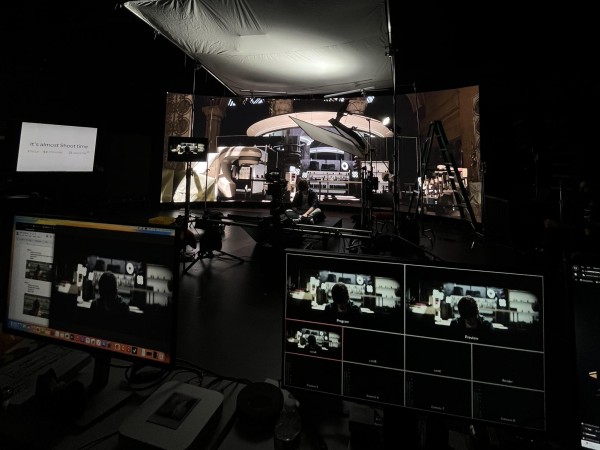Filmmakers now have the opportunity to test out the industry’s newest technology at WLab, a virtual production studio, partnered with NYU Tandon @ The Yard. Founded by a group of students earlier this year, the studio provides high-scale production services to artists across the city. Co-founder and Tisch senior Timothy Wang sat down with WSN to speak about the startup, as well as the power of virtual film production.
In late 2022, Wang noticed an emergence of virtual production studios. He was interested in their potential for student filmmakers who lack funds and access to different filming locations. However, these preexisting in-person studios quote filmmakers like Wang up to $45,000 a day to use their facilities, furthering his desire to democratize virtual film production. Wang and a collective of NYU, School of Visual Arts and The Savannah College of Art and Design students opened WLab in 2023, hoping to expose filmmakers of all backgrounds to virtual production.
Virtual production allows filmmakers to utilize green-screen technology and visual effects without the need for a post-editing team. Motion capture technology and in-camera VFX are used in conjunction with extended-reality environments to create immersive, interactive settings for a shoot. The XR environments are made using Epic Games’s Unreal Engine program, then projected onto a 30-foot tall, 11-foot wide LED wall at WLab for each shoot.
Wang believes one benefit of virtual production over the traditional green screen lies in its efficiency.
“You can make sure you’re getting exactly what you want on the set and begin editing as soon as you’re done with the shoot,” Wang said. “It’s better than being in a room of green and not knowing what you’re shooting.”
The motion capture studio at WLab has hosted nearly 30 projects since May, including projects for Sony Music and Verizon. In September, WLab created the first-ever Virtual XRunway for New York Fashion Week, where a treadmill and Unreal Engine helped depict models strutting atop a moving subway train. WLab is currently self-sustained through its projects and has sourced their technology from local studios and manufactures, such as The Studio-B&H.
“We’re not here to just do what everyone else is doing in commercial production. We’re here to really push the limits of what we can do and innovate,” Wang said. “We always pick an impossible task. We want to do what other people haven’t done. Our goal is to get people on board with the future of film, and want to push the industry forward.”

WLab offers a virtual production grant for first-time virtual production filmmakers looking to shoot a project at the facility. CAS junior Patrice Yip was awarded this grant this past fall for her experimental dance short film titled “Knots,” which centers around a woman’s journey navigating her abusive relationship.
Yip sought out WLab because building a physical set design would not have fit her budget or vision for the short film.
“There was a part of the film where the dancer was dancing on the ceiling of her void-like apartment, which could have only been done with the unreal background,” Yip said. “The grant allowed that vision to come to life.”
The grant not only gives access to WLab’s facilities and equipment, but it also provides onsite support from the lab’s crew. Throughout the production process for “Knots,” Yip shared that crew members and technicians at WLab came in on their off days just to support her team and ensure that her vision was actualized.
“The amount of care that is put into this project — although WLab is not getting any payment from it — is commendable,” Yip said. “I am grateful for everyone on my crew, especially the WLab crew as well. Without [them], this project would have been much [on a] smaller scale and my vision would not have been fully realized.”
WLab’s facilities are currently used in NYU Tandon’s graduate Integrated Design and Media and Interactive Telecommunications Program’s virtual production classes. These courses in virtual production were developed in collaboration with Epic Games.
In 2024, Tisch will open the Martin Scorsese Virtual Production Center at Industry City, which will offer additional space for filmmakers to interact with virtual production. Wang hopes that exploring WLab’s offerings now will pique an interest in the new center and its future programs.
“We hope that we can train people who are interested in their programs on how to operate these stages,” Wang says.
Breaking into virtual production doesn’t have to be complicated, according to Wang. He urges newcomers to not be afraid of interacting with new technologies, and to be willing to accept change.
“When people think of virtual production or anything that seems expensive and technically complex, it’s always important to not give up so quickly,” says Wang, “If you go to a school like NYU and you have the privilege to change the industry you’re pursuing, it gives a lot of meaning to it.”
If you are a filmmaker with a project idea, you can contact WLab or apply for a project grant.
Contact Dani Biondi at [email protected].